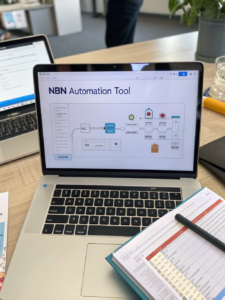Quantum Leap Funding: Why Venture Capital is Doubling Down on Quantum Computing Startups
The Quantum Leap in Finance: Venture Capital Funding for the Next Generation of Computing The world of finance is undergoing a radical transformation, fueled by breakthroughs in technology. At the forefront of this revolution lies quantum computing, and the race to unlock its potential is driving a surge in venture capital funding quantum computing startups. This isn't just about theoretical physics anymore; it's about building the future of computation, and investors are taking notice. The convergence of powerful algorithms, specialized hardware, and ambitious entrepreneurs is creating an ecosystem ripe for disruption. Understanding the trends in quantum computing investment is crucial for anyone looking to navigate the intersection of technology and finance. This post delves into the current landscape, key players, challenges, and future opportunities in this rapidly evolving space. Understanding the Quantum Computing Investment Landscape Quantum computing promises to solve problems currently intractable for even the most powerful supercomputers. Applications span drug discovery, materials science, financial modeling, cryptography, and artificial intelligence. Its potential impact is so significant that governments and private investors globally are pouring resources into its development. The core of this burgeoning field revolves around manipulating quantum bits (qubits) – unlike classical bits that represent 0 or 1, qubits can exist in a superposition of both states simultaneously, enabling exponentially more complex calculations. The current quantum computing investment landscape is characterized by: Early-Stage Funding: Seed and Series A rounds are particularly active, supporting startups developing quantum algorithms, software tools, and hardware components. Strategic Partnerships: Established tech giants are investing in quantum companies to gain access to cutting-edge technology and talent. For instance, IBM, Google, and Microsoft have dedicated quantum computing divisions and are actively participating in the ecosystem. Government Initiatives: Governments worldwide are launching national quantum initiatives, offering grants, tax incentives, and research funding to accelerate development. The US National Quantum Initiative and similar programs in Europe and Asia are significant drivers of growth. Focus Areas: Venture capital funding quantum computing startups is concentrating on several key areas, including: Quantum Algorithms: Developing algorithms tailored for specific quantum computers and applications. Quantum Software: Creating user-friendly software platforms for accessing and utilizing quantum computing resources. Quantum Hardware: Building and refining the physical components of quantum computers (e.g., superconducting qubits, trapped ions). Quantum Error Correction: Developing methods to mitigate errors inherent in qubits and ensure reliable computations. Key Players Driving Quantum Computing Investment The venture capital funding quantum computing startups scene involves a diverse range of players, from seasoned venture capital firms to corporate venture arms and government agencies. Here are some notable contributors: Andreessen Horowitz (a16z): A prominent VC firm with a significant focus on enterprise technology, including quantum computing. They've invested in several leading quantum companies. Sequoia Capital: Another leading VC firm with a portfolio of quantum computing companies. Kleiner Perkins: An early backer of many tech giants, Kleiner Perkins is also actively investing in quantum computing. Intel Capital: Intel's venture capital arm is investing in quantum computing startups to strengthen its position in the field. Governments: National Quantum Initiatives in the US, Europe, and Asia-Pacific are significant sources of funding through grants and research programs. The flow of quantum computing investment isn’t limited to VC funds; corporate venture arms from major technology companies also play a pivotal role. These investments often come with strategic collaborations and access to resources. Challenges & Risks in Quantum Computing Investment Despite the immense potential, quantum computing investment is not without its challenges: Technological Maturity: Quantum computing is still in its early stages of development. Fault-tolerant quantum computers are years away. High Costs: Building and maintaining quantum computers is extremely expensive. Talent Shortage: There is a significant shortage of skilled quantum scientists and engineers. Algorithm Development: Developing quantum algorithms that outperform classical algorithms is a complex and ongoing process. Scalability: Scaling quantum computers to handle real-world problems remains a major hurdle. However, the potential rewards far outweigh these risks for investors who are willing to take a long-term view. The Intersection of Quantum Computing and AI Agents/Automation The integration of quantum computing with artificial intelligence (AI) agents and automation represents a paradigm shift. Quantum-enhanced AI could accelerate machine learning processes, enabling the development of more powerful and sophisticated AI systems. This synergy could revolutionize industries such as finance, healthcare, and materials science. Quantum Machine Learning: Quantum algorithms can potentially speed up training times for machine learning models. Optimization Problems: Quantum computers excel at solving complex optimization problems, which are common in AI. Data Analysis: Quantum machine learning could enable the analysis of vast and complex datasets to uncover hidden patterns. For instance, imagine an AI agent capable of optimizing investment portfolios with unprecedented accuracy, or a drug discovery system that can identify promising drug candidates in a fraction of the time using quantum-enhanced machine learning. This convergence is a significant driver of venture capital funding quantum computing startups. Alternative Investment Strategies in the Quantum Era Beyond direct investment in quantum computing companies, investors are exploring alternative strategies to capitalize on the quantum revolution: Investing in Companies Leveraging Quantum Technology: Companies utilizing quantum computing or quantum-inspired algorithms in their products and services. Quantum-Related Infrastructure: Investing in companies providing the necessary infrastructure for quantum computing, such as cryogenic systems and control electronics. **Quantum Cybersecurity:** Investing in companies developing quantum-resistant cryptography to safeguard data in the quantum era. Quantum Materials: Investing in research and development of new materials optimized for quantum computing applications. Investment Area Description Potential Risk Potential Reward Quantum Computing Startups Direct investment in companies developing quantum hardware/software Technological uncertainty, high failure rate High returns if successful Quantum-Enabled AI Companies integrating quantum algorithms into AI applications Limited adoption, scalability challenges Significant competitive advantage Quantum Cybersecurity Companies developing quantum-resistant cryptography Rapid technological advancements in quantum computing Protection of valuable data Quantum Materials Research and development of materials for quantum computers Development timelines, material properties Breakthroughs in quantum computing performance Looking Ahead: A Future Powered by Quantum The near future promises even more exciting developments in venture capital funding quantum computing startups. As quantum technology matures, we can expect to see: Increased Investment: Continued growth in quantum computing investment as the technology becomes more practical and accessible. New Applications: The emergence of novel applications across a wide range of industries. Quantum Ecosystem Growth: The development of a vibrant quantum ecosystem, fostering innovation and collaboration. Bridging the Gap: Efforts to bridge the gap between academic research and commercialization. The quantum revolution is not a distant prospect; it's happening now. Ready to dive deeper? Follow us on LinkedIn and share your thoughts in the comments below! What are your expectations for the future of quantum computing?
Share this content:














Post Comment